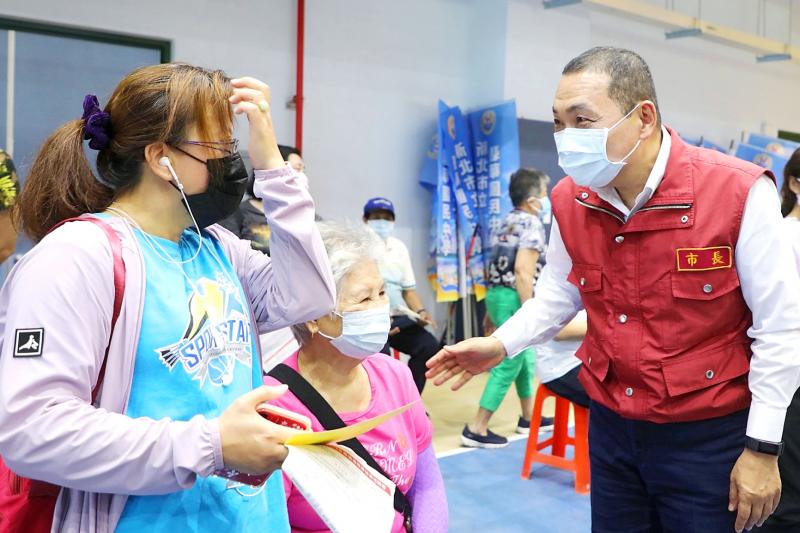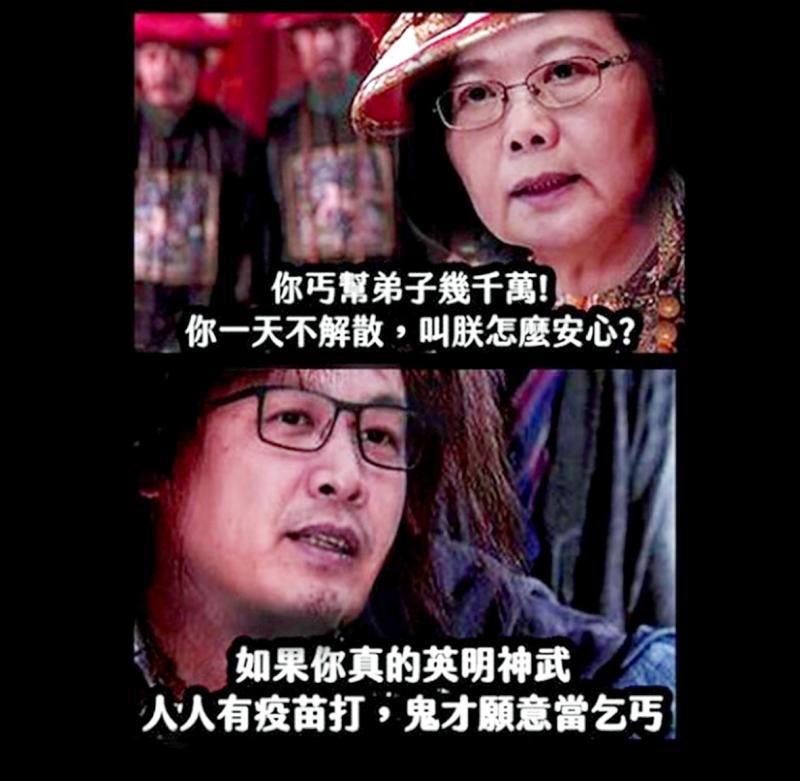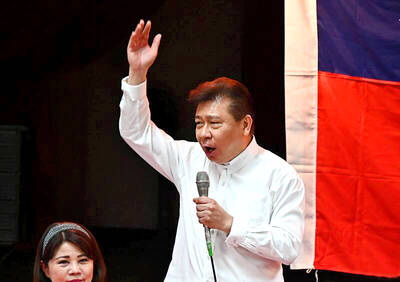Several years ago, an American official who was then leaving Taiwan remarked to me that the Chinese Nationalist Party (KMT) had changed, that it “was not your Daddy’s KMT.” He was wrong. Luckily for Taiwan, it’s still the KMT I’ve known throughout my entire time here.
KMT Chairman Johnny Chiang (江啟臣) on Thursday vetoed a proposal to congratulate the Chinese Communist Party (CCP) on its 100th anniversary. This did not stop party luminaries, including former chairman and presidential candidate Lien Chan (連戰) and former KMTer James Soong (宋楚瑜), from sending along congratulations — names that the Chinese media gleefully listed.
Indeed, former KMT chairman and failed reactionary presidential candidate Hung Hsiu-chu (洪秀柱), who also congratulated the CCP, announced on Facebook that she would get vaccinated with the Chinese vaccine when she attends the cross-strait forum at the end of this month.

Photo courtesy of the New Taipei City Government
Though avoiding direct congratulations, the KMT did tweet about “seeking commonalities and shelving disputes” to talk to China, standard language on Taiwan-China relations. But it ended with “Only in this way can we pursue #Democracy, #Peace and #Prosperity for the entire #ChineseNation.”
Verbiage like “the entire Chinese nation” has little appeal in Taiwan. But the selection of that term, instead of something like “both sides” or a vague “Asia” or simply leaving off the last five words, highlights the retrograde mindset that still dominates the KMT.
Hung’s critical remarks on Democratic Progressive Party (DPP)’s vaccine policies also cribbed language from the KMT’s propaganda campaign, which has been pushing Chinese vaccines while criticizing other vaccines, and attacking the government of Tsai Ing-wen (蔡英文).

Photo: Screen grab from Lo Chih-chiang’s Facebook page
THE KMT’S VACCINE HYPOCRISY
When Taiwan accepted a vaccine donation from the US a couple of weeks ago, KMT Institute of Revolutionary Practice director Lo Chih-chiang (羅智強) said that Taiwan was a “vaccine beggar.”
Last week KMT caucus secretary-general Cheng Li-wen (鄭麗文) said that the proportion of deaths after vaccination with the AstraZeneca shot in Taiwan is “horrifyingly high,” higher than in other nations. KMT Central Standing Committee member Sean Lien (連勝文), Lien Chan’s son, also attacked the AstraZeneca vaccine in a Facebook post.
Then the news broke that his father had jumped the vaccine queue to get his shots early, as had other prominent KMT members, including failed Taipei Mayoral candidate Ting Shou-chung (丁守中), and former KMT legislator Chang Hsien-yao (張顯耀), who had also accused the government of being a “vaccine beggar.”
All of them were vaccinated with the AstraZeneca vaccine, according to DPP legislative caucus secretary-general Lo Chih-cheng (羅致政). Health facilities in Taipei received fines and public criticism for permitting such queue jumping.
Privileged KMT members jumping the queue to get vaccinations? Just like the old days, when the KMT ran things. KMT members attacking the DPP because the vaccines were donations from Japan? Being anti-Japan is in the KMT’s DNA.
It should not be forgotten that this anti-vaccine campaign takes place in an information ecology flooded with vaccine and COVID-19 disinformation. Since much of the disinformation comes from China, the KMT appears to be knowingly cooperating with the expansionist dictatorship next door in hurting Taiwan.
When a major political party lends its voice to anti-vaccine propaganda, people could die.
The new attack on the AstraZeneca shot has another angle. The KMT initially promoted Chinese vaccines, but in recent weeks countries that have used that vaccine liberally have reported extensive outbreaks and are revaccinating with more effective vaccines when possible.
For example, Chile, Bahrain and Mongolia, which used the Chinese vaccine to vaccinate over 50 percent of the population, were all in the top 10 countries for outbreaks at the end of June. In mid-June Indonesia was fighting an outbreak among its health workers vaccinated with the Sinopharm vaccine, which fortunately reduced the severity of the disease.
By attacking AstraZeneca and keeping the media focused on it, the KMT diverts attention from the failures of the Chinese vaccines it has been touting.
NATIVE TAIWANESE NOT TO BE TRUSTED
Another key signal of the KMT’s failure to change is its treatment of New Taipei City Mayor Hou You-yi (侯友宜). Hou is a native Taiwanese (本省人) and former head of the National Police Agency. He leads most polls on the performance of Taiwan’s city mayors, often by wide margins. A consummate politician, he was once courted by the DPP, and maintains good relations with it.
In any rational party, a popular, competent, politically skilled politician with broad appeal across the political divide would be the party leader, out in front on issues of importance and promoted constantly as the future presidential candidate.
Not in the KMT, where native Taiwanese candidates are viewed with suspicion by the old waishengren (外省人) — people who fled from China with the KMT after 1949 — guard. Many of these “deep blue” waishengren remember how KMT president Lee Teng-hui (李登輝), a native Taiwanese, turned out to be an independence supporter and was the father of Taiwan’s democracy, a democracy that has curtailed KMT power and privilege. A native Taiwanese like Hou has little chance of gaining support from that crowd, because of his “blood.”
These ideas about “blood” drive in deep blue conspiracy theories claiming that president Lee was half-Japanese. Such clownish claims show that underlying KMT thinking is a traditional racial order, in which people behave the way they do because of “blood.”
This type of thinking also appears in the way the children of prominent KMT members enjoy elite status and access to public positions, especially prominent in the way Legislator Chiang Wan-an (蔣萬安), acquired rock-star status in the KMT simply because he is the great-grandson of Chiang Kai-shek (蔣介石).
Hou has been quiet on his China stance, but if he does run for President in 2024, he will have to declare one. With the COVID issue dominating the headlines every day, there has not been much commentary on the KMT’s inability to produce a China relations framework that permits their candidate the flexibility he will need to win against a mainstream electorate that is largely pro-Taiwan independence.
In March of this year, for example, chairman Chiang said that the party will update its approach to the fictional 1992 Consensus to emphasize the Republic of China (ROC) as a political entity. The 1992 Consensus remains unpopular, since China has never accepted the “each side with its own interpretation” codicil that the KMT claims makes it workable. For Beijing, the 1992 Consensus means that Taiwan is part of China, period.
That fact at this late date, the KMT is still trying to make this zombie policy live again, and cage their 2024 presidential candidate with it, tells you all you need to know about the minds that rule inside the KMT: still my Daddy’s KMT.
Notes from Central Taiwan is a column written by long-term resident Michael Turton, who provides incisive commentary informed by three decades of living in and writing about his adoptive country. The views expressed here are his own.

March 10 to March 16 Although it failed to become popular, March of the Black Cats (烏貓進行曲) was the first Taiwanese record to have “pop song” printed on the label. Released in March 1929 under Eagle Records, a subsidiary of the Japanese-owned Columbia Records, the Hoklo (commonly known as Taiwanese) lyrics followed the traditional seven characters per verse of Taiwanese opera, but the instrumentation was Western, performed by Eagle’s in-house orchestra. The singer was entertainer Chiu-chan (秋蟾). In fact, a cover of a Xiamen folk song by Chiu-chan released around the same time, Plum Widow Missing Her Husband (雪梅思君), enjoyed more

Last week Elbridge Colby, US President Donald Trump’s nominee for under secretary of defense for policy, a key advisory position, said in his Senate confirmation hearing that Taiwan defense spending should be 10 percent of GDP “at least something in that ballpark, really focused on their defense.” He added: “So we need to properly incentivize them.” Much commentary focused on the 10 percent figure, and rightly so. Colby is not wrong in one respect — Taiwan does need to spend more. But the steady escalation in the proportion of GDP from 3 percent to 5 percent to 10 percent that advocates

From insomniacs to party-goers, doting couples, tired paramedics and Johannesburg’s golden youth, The Pantry, a petrol station doubling as a gourmet deli, has become unmissable on the nightlife scene of South Africa’s biggest city. Open 24 hours a day, the establishment which opened three years ago is a haven for revelers looking for a midnight snack to sober up after the bars and nightclubs close at 2am or 5am. “Believe me, we see it all here,” sighs a cashier. Before the curtains open on Johannesburg’s infamous party scene, the evening gets off to a gentle start. On a Friday at around 6pm,

A series of dramatic news items dropped last month that shed light on Chinese Communist Party (CCP) attitudes towards three candidates for last year’s presidential election: Taiwan People’s Party (TPP) founder Ko Wen-je (柯文哲), Terry Gou (郭台銘), founder of Hon Hai Precision Industry Co (鴻海精密), also known as Foxconn Technology Group (富士康科技集團), and New Taipei City Mayor Hou You-yi (侯友宜) of the Chinese Nationalist Party (KMT). It also revealed deep blue support for Ko and Gou from inside the KMT, how they interacted with the CCP and alleged election interference involving NT$100 million (US$3.05 million) or more raised by the